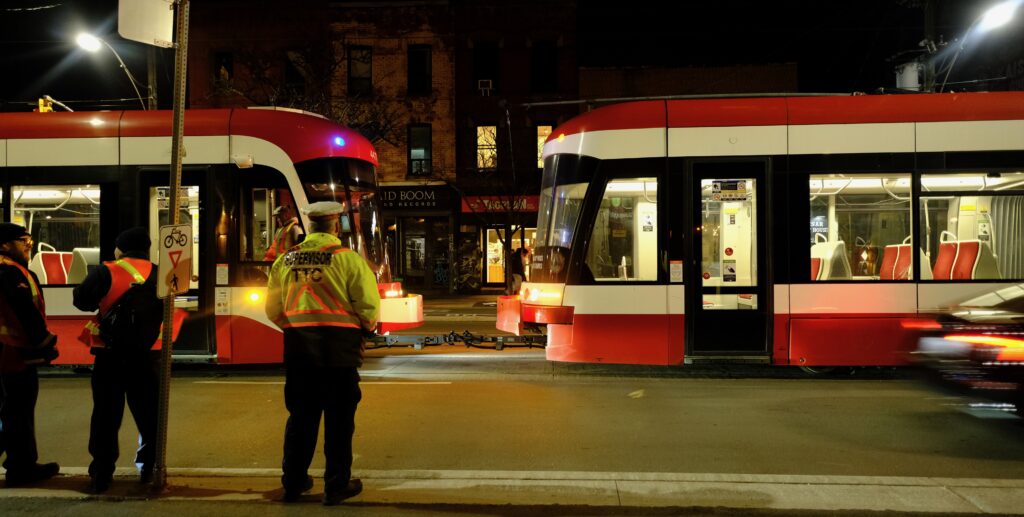
I grew up in Toronto, then spent a bunch of years in Vancouver, and came back just before the pandemic. Vancouver is a small city, and I didn’t have much of a relationship with transit there–a couple of buses I took regularly, but outside of that I spent way more time on a bike, and some in a car. Toronto is an entirely different story and it’s not an exaggeration to suggest that one of the reasons I was happy to buy the home I did was the fact that the Queen streetcar stopped right across the road.
Well, it did for a while. Then there was a more-than-two-year-but-less-than-three period of shuttle buses, multiple transfers and trips that took forever. It sucked. There’s another route I can take which is a single bus to a Subway, but even in rush hour that bus runs once every twenty minutes. It can mean a lot of waiting.
One of the most striking things about coming back was that transit here…hadn’t really changed. Sure, the subway lines were renamed. The Spadina LRT was improved a little (it is, by the way, out of service right now.) The Scarborough RT…ahem, Line 3… was as bad as ever, and a major accident means it didn’t even make it to its scheduled decommissioning date.
Why so bad? TVO has an article that points to consultants as the root of the problem at least from a cost perspective. Essentially, the city has completely lost the ability to build transit without going over budget to private consultants and the results haven’t shown any improvement. The Eglinton Crosstown is so late it’s a joke. Like the Sheppard subway extension, the route is so short it will offer marginal value at best.
Tunnels are being dug for the Scarborough Subway but let’s pause for a moment before we heap to much praise: my family moved to Scarborough in 1978, and we were told a station would be built at Markham & Sheppard “soon.” There’s still no plan for a station at that major intersection (it will be at McCowan instead) and, in fact, the entirety of Scarborough east of McCowan remains underserved.
Meanwhile, Doug Ford blames congestion on bike lanes that have less than 2% of the road space in the city, and even less in suburban areas. There are no bike lanes on the perennially crawling Gardiner/Don Valley Expressway and certainly none on the equally slow 401.
Maybe, just maybe…the problem is that in the last 30 years there’s been only a marginal investment in public transit. Maybe a TTC that’s overly reliant on fares (which all but disappeared during the pandemic, and have been severely impacted by increased levelsworking from home) rather than being funded through general taxation is a part of the problem. Maybe a government that saw public transit as an investment in the future instead of prioritizing automobiles is part of the problem. (I’m not a saint, incidentally, and I do own a car…but I so rarely drive it it’s not even funny and it generally involves longer trips. I’m hopeful it’s my last one.)
Contrasting examples abound: ignore Copenhagen and its bicycles, fine–I’m a cyclist but I get it. Look at the Paris Metro, which blankets the city, is the preferred method of getting around for many is is more cost effective that the TTC by far. New York, of course, where owning a car is an act of folly–let alone driving it. Santiago and Bogota are often held up as examples. Transit mapping on phones makes it easy when you visit a place like this to get around–stand on a corner, choose your destination and you phone tells you exactly where to get on, get off and where to transfer. It’s part of making these systems fantastic.
Whatever other cities are doing, it’s pretty clear that something in Toronto is broken. There’s been so little investment that catching up will be costly and risky. Construction will cause chaos in the interim, and the city will suffer but if we want to build the Toronto of the future something has to be fixed: ditch the consultants and internalize the knowledge. Build transit for people who live here, not visitors. Build it in a way that shows you understand the city intimately, not just as random lines on a map.
I love this city, but I don’t love its transit. That needs to change.